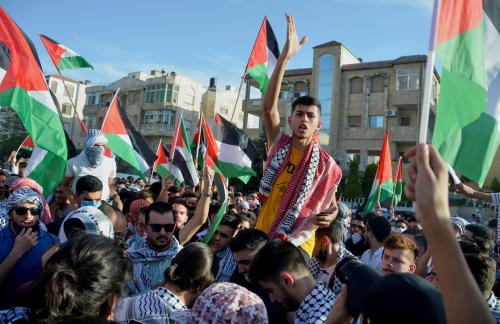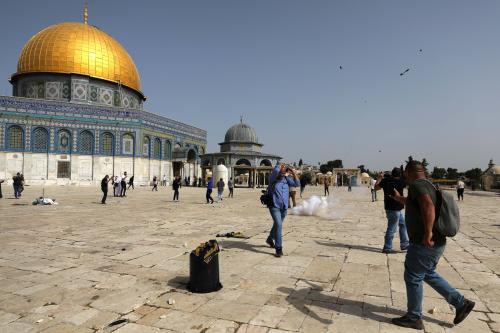To correctly understand the recent eruption of violence in Gaza it is critical to consider the larger context of Sheikh Jarrah and the occupation, more generally. In particular, attention needs to be paid to the reality of the severe power imbalance in the conflict and the impact it has on prospects for true and lasting peace, writes Shadi Hamid. This piece first appeared in The Atlantic.
As always in the Israeli-Palestinian conflict, two narratives are vying for primacy. In one, Israel is simply defending itself against a fresh attack. In the other, Israel’s bombardment of Gaza is the latest example of a desire to punish and humiliate Palestinians. These two narratives are not reconcilable, which makes reasoned discussion an exercise in futility. But any sophisticated argument must contend with the long, winding lead-up to the current crisis. Why is war in Gaza returning now, and why does it always seem to return, with stubborn, periodic insistence?
Despite inching toward the Democratic Party’s left flank on various domestic- and foreign-policy issues, the Biden administration has fallen back on the usual formulas, offering robotic recitations about “Israel’s right to defend itself.” On Thursday, President Joe Biden said that he hadn’t seen a “significant overreaction” from Israel, while failing to mention a word about Palestinian deaths. In so doing, he gave Israel what amounts to a green light to intensify its bombing campaign.
The White House has been eager to highlight Biden’s “unwavering support” for Israel, which raises the question of what, if anything, might cause America’s support for the Israeli government to waver even slightly. This question is worth asking sooner rather than later, now that more than 120 Palestinians have died, a quarter of them children — all in a few days — according to Palestinian officials.
Supporters of the status quo tend to focus on the fact that Hamas started lobbing rockets into Israel, and they argue that Israel has no choice but to retaliate, as any other country would. Some even suggest that the Israeli army is historically unparalleled in its efforts to spare civilian casualties. This line of argument, however, does not tend to offer many details on how this latest conflagration came to be. Why is all of this happening now? Wars and skirmishes don’t occur in a vacuum; they are the result of an accumulation of actions and reactions over years, if not decades.
A potential reputational cost attends even asking these questions. Those who do are often accused of justifying or supporting Hamas’s actions. But it should be possible to do two things at once — first, to note that Hamas is a U.S.-designated terrorist organization. This is not in doubt, and to my knowledge there isn’t a particularly large grassroots movement to eliminate the designation. Hamas’s rockets are indiscriminate and are designed to terrorize Israeli civilians. They might hit schools or hospitals, or they might not. It is this lack of knowing that makes them “effective,” despite their imprecision. These are war crimes, as Human Rights Watch has documented. Second, it should also be possible to recognize that the current conflict in Gaza didn’t appear from the sky unannounced, a product of random chance.
If we want to prevent violence or terrorist activity from happening in the future, then we have to understand what motivates violence or terrorist activity. This is a straightforward observation, albeit a fraught one. Shortly after the September 11 attacks, attempts to understand why were viewed by many as terrorism apologetics. Among scholars and analysts of violent extremism, however, it is close to an article of faith that contextual factors make resorting to violence either more or less likely. The goal is to understand what they are and, ideally, to try to address them.
Consider that even the George W. Bush administration made a rather sophisticated and somewhat original argument about the “root causes” of the September 11 attacks. President Bush and his top aides argued that citizens are more likely to resort to violence when they lack peaceful, constructive means to express their grievances. Accordingly, September 11 did not happen because Arabs despised our freedom, but rather because the Middle East’s stifling political environment bred anger, frustration, and ultimately hate. Part of the long-term solution, then, was to promote democratic reform and basic political rights. Later, when the Islamic State rose to prominence, in 2013, a whole literature emerged on the causes and grievances that led to the organization’s rise. When a white supremacist murdered 50 Muslims in Christchurch, New Zealand, in March 2019, I argued in favor of assessing the arguments and motivations in his 74-page manifesto — not to give those views legitimacy, as some feared, but to understand the drivers of radicalization.
In the case of the current situation in Gaza, the objective is not to carefully assess Hamas’s “grievances.” The group’s behavior is not particularly mysterious. Hamas leaders see anger against Israel building among ordinary Palestinians, and they see an opportunity to weaponize it. They send rockets across the border and invite destruction because they wish to project relevance and rally domestic support after years of diminished popularity. Hamas is not a bunch of crazed lunatics. Selfish, self-serving, and cavalier toward Palestinian life, its leaders are acting according to a traditional rational-actor model. Whether or not we like it, they believe they will benefit from the crisis — and they may, in reality, find themselves in a stronger position when this is over.
This is one step in the analysis, but it still doesn’t tell us much about why Palestinian anger had been rising in the first place. The progressive wing of the Democratic Party tends to emphasize the original “source” of the current violence. This source isn’t exactly a secret either. As The New York Times reported: “The trouble started on Monday, when a heavy-handed police raid at Jerusalem’s Al Aqsa Mosque — the third-holiest site in Islam, located atop a site also revered by Jews — set off an instant backlash.” Yet while the police raid was actually unfolding — during the final days of Ramadan and at such a sensitive site — I found only minimal coverage in mainstream outlets. I relied instead on Twitter, Instagram, and Facebook accounts that were covering the raid and its aftermath in real time, although many were censored for “sensitive content.” The tragedy, upon other tragedies, is that the world seems to pay attention to Palestinians only when they use violence. Nonviolent activism goes largely ignored.
Tensions had, in fact, been building for months, with the threatened eviction of Palestinian families from the Sheikh Jarrah neighborhood of East Jerusalem. Smaller protests in the area, taking place at a steady clip for some time, grew larger. But even these details don’t capture the broader context. What is so important about Sheikh Jarrah, and why are Palestinian families being faced with eviction in the first place? As NBC News reported: “The expansion of Jewish settlements in Sheikh Jarrah, which is on land that helps form the final link in a settlement circle surrounding east Jerusalem — an area that Palestinians hope will be the capital of a future state.”
That aspiration matters, but seemingly not much to those who see Israel’s right to self-defense as the only truly salient issue. They don’t see the occupation itself — and what has flowed from it — as the original sin. And because they don’t recognize the centrality of the occupation, they don’t acknowledge what is so obvious to the other side: the basic fact of a lopsided power dynamic, in which Israel is the aggressor and Palestinians are the aggressed. This imbalance ought to matter — and not just for moral reasons. American policymakers, regardless of whether they see Palestinians as fully deserving of rights and dignity, should understand that wildly unequal power and capabilities make peace all but impossible. Absent international pressure, the more powerful actor has few incentives to offer substantive compromises and concessions to the weaker party.
The Biden administration is acting as if the past several years (or decades) have not happened. It is repeating the same mistakes as its predecessors, while hoping that a cease-fire can bring an end to hostilities and a return to calm. But until fundamental injustices — and Palestinian national aspirations — are addressed by ending an occupation that has lasted longer than my own existence, the calm will prove uneasy. Maybe that’s good enough for Biden. But it shouldn’t be.
The Brookings Institution is committed to quality, independence, and impact.
We are supported by a diverse array of funders. In line with our values and policies, each Brookings publication represents the sole views of its author(s).










Commentary
Don’t take the narrow view of what’s happening in Gaza
May 18, 2021